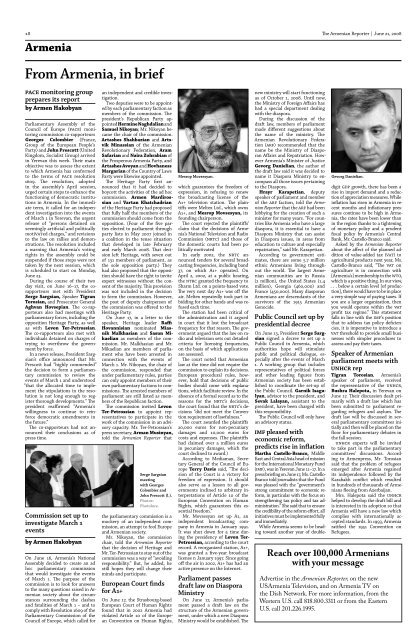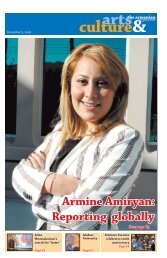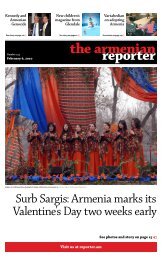Armenian Reporter
Armenian Reporter
Armenian Reporter
You also want an ePaper? Increase the reach of your titles
YUMPU automatically turns print PDFs into web optimized ePapers that Google loves.
18 The <strong>Armenian</strong> <strong>Reporter</strong> | June 21, 2008ArmeniaFrom Armenia, in briefPACE monitoring groupprepares its reportby Armen HakobyanParliamentary Assembly of theCouncil of Europe (PACE) monitoringcommission co-rapporteursGeorges Colombier (France,Group of the European People’sParty) and John Prescott (UnitedKingdom, Socialist Group) arrivedin Yerevan this week. Their mainobjective was to assess the extentto which Armenia has conformedto the terms of PACE resolution1609. The resolution, adoptedin the assembly’s April session,urged certain steps to enhance thefunctioning of democratic institutionsin Armenia. In the immediateterm, it called for an independentinvestigation into the eventsof March 1 in Yerevan, the urgentrelease of “persons detained onseemingly artificial and politicallymotivated charges,” and revisionsto the law on rallies and demonstrations.The resolution includeda warning that Armenia’s votingrights in the assembly could besuspended if those steps were nottaken by the next session, whichis scheduled to start on Monday,June 23.During the course of their twoday visit, on June 16–17, the corapporteursmet with PresidentSerge Sargsian, Speaker TigranTorosian, and Prosecutor GeneralAghvan Hovsepian. The co-rapporteursalso had meetings withparliamentary forces, including theopposition Heritage Party, as wellas with Levon Ter-Petrossian.The co-rapporteurs also met withindividuals detained on charges oftrying to overthrow the governmentby force.In a news release, President Sargsian’soffice announced that Mr.Prescott had “highly commended”the decision to form a parliamentarycommission to review theevents of March 1 and understood“that the allocated time to implementthe stipulations in the resolutionis not long enough to registerthorough developments.” Thepresident reaffirmed “Armenia’swillingness to continue to reinforcedemocratic amendments inthe future.”The co-rapporteurs had not announcedtheir conclusions as ofpress time.Commission set up toinvestigate March 1eventsby Armen HakobyanOn June 16, Armenia’s NationalAssembly decided to create an adhoc parliamentary commissionthat would investigate the eventsof March 1. The purpose of thecommission is to look for answersto the many questions raised in <strong>Armenian</strong>society about the circumstancessurrounding the clashesand fatalities of March 1 – and tocomply with Resolution 1609 of theParliamentary Commission of theCouncil of Europe, which called foran independent and credible investigation.Two deputies were to be appointedby each parliamentary faction asmembers of the commission. Thepresident’s Republican Party appointedHermine Naghdalian andSamuel Nikoyan; Mr. Nikoyan becamethe chair of the commission.Artashes Shahbazian and ArtsvikMinassian of the <strong>Armenian</strong>Revolutionary Federation, AramSafarian and Naira Zohrabian ofthe Prosperous Armenia Party, andArtashes Avoyan and HovhanessMargarian of the Country of LawsParty were likewise appointed.The Heritage Party first announcedthat it had decided toboycott the activities of the ad hoccommission. Armen Mardirossianand Vartan Khatchadrianof the Heritage Party had proposedthat fully half the members of thecommission should come from theopposition. (Four of the five partieselected to parliament throughparty lists in May 2007 joined ina coalition in the tense situationthat developed in late Februaryand early March 2008. That decisionleft Heritage, with seven outof 131 members of parliament, asthe sole opposition party.) Theyhad also proposed that the oppositionshould have the right to inviteexpert witnesses without the consentof the majority. This provisionwas not included in the decisionto form the commission. However,the post of deputy chairperson ofthe commission was offered to theHeritage Party.On June 17, in a letter to thespeaker, Heritage leader RaffiHovannisian nominated MiasnikMalkhasian and Sasun Mikaelianas members of the commission.Mr. Malkhasian and Mr.Mikaelian are members of parliamentwho have been arrested inconnection with the events ofMarch 1. Mr. Nikoyan, the chair ofthe commission, responded thatunder parliamentary rules, partiescan only appoint members of theirown parliamentary factions to commissions.The arrested members ofparliament are still listed as membersof the Republican faction.The commission invited LevonTer-Petrossian to appoint representativesto participate in thework of the commission in an advisorycapacity. Mr. Ter-Petrossian’spress secretary, Arman Musinyan,told the <strong>Armenian</strong> <strong>Reporter</strong> thatSerge Sargsianmeetingwith GeorgesColombier andJohn Prescott (l.).Photos:Photolure.the parliamentary commission is amockery of an independent commission,an attempt to fool Europeand <strong>Armenian</strong> society.Mr. Nikoyan, the commissionchair, told the <strong>Armenian</strong> <strong>Reporter</strong>that the decision of Heritage andMr. Ter-Petrossian to stay out of thecommission was a way of “avoidingresponsibility.” But, he added, hestill hopes they will change theirminds and participate.European Court findsfor A1+On June 17, the Strasbourg-basedEuropean Court of Human Rightsfound that in 2002 Armenia hadviolated Article 10 of the EuropeanConvention on Human Rights,Mesrop Movsesyan.which guarantees the freedom ofexpression, in refusing to renewthe broadcasting license of theA1+ television station. The plaintiffswere Meltex Ltd., which ownsA1+, and Mesrop Movsesyan, itsfounding chairperson.The court rejected the plaintiffs’claim that the decisions of Armenia’sNational Television and RadioCommission (NRTC) and those ofthe domestic courts had been politicallymotivatedIn early 2002, the NRTC announcedtenders for several broadcastingfrequencies, including band37, on which A1+ operated. OnApril 2, 2002, at a public hearing,the NTRC granted the frequency toSharm Ltd. on a points-based vote.The very next day A1+ was off theair. Meltex repeatedly took part inbidding for other bands and was refusedeach time.The station had been critical ofthe administration and it arguedin court that it lost the broadcastfrequency for that reason. The governmentargued that the law on radioand television sets out detailedcriteria for licensing frequencies,on the basis of which applicationsare assessed.The court noted that <strong>Armenian</strong>law at the time did not require thecommission to explain its decisions.European procedural rules, however,hold that decisions of publicbodies should come with explanations,which facilitate review. In theabsence of a formal record as to thereasons for the NRTC’s decisions,the court found that the NRTC’s decisions“did not meet the Conventionrequirement of lawfulness.”The court awarded the plaintiffs20,000 euros for non-pecuniarydamages and 10,000 euros forcosts and expenses. (The plaintiffshad claimed over a million eurosin pecuniary damages, which thecourt declined to award.)According to Mediamax, SecretaryGeneral of the Council of EuropeTerry Davis said, “The decisionof the Court is a victory forfreedom of expression. It shouldalso serve as a lesson to all governmentsinclined to arbitrary interpretationsof Article 10 of theEuropean Convention on HumanRights, which guarantees this essentialfreedom.”Mr. Movsesyan set up A1, anindependent broadcasting companyin Armenia in January 1991.It was shut down for a time duringthe presidency of Levon Ter-Petrossian, according to the courtrecord. A reorganized station, A1+,was granted a five-year broadcastlicense n January 1997. Since goingoff the air in 2002, A1+ has had anactive presence on the Internet.Parliament passesdraft law on DiasporaMinistryOn June 17, Armenia’s parliamentpassed a draft law on thestructure of the <strong>Armenian</strong> government,under which a new DiasporaMinistry would be established. Thenew ministry will start functioningas of October 1, 2008. Until now,the Ministry of Foreign Affairs hashad a special department dealingwith the diaspora.During the discussion of thedraft law, members of parliamentmade different suggestions aboutthe name of the ministry. The<strong>Armenian</strong> Revolutionary Federation(ARF) recommended that thename be the Ministry of DiasporanAffairs and Repatriation. HoweverArmenia’s Minister of JusticeGevorg Danielian, the author ofthe draft law said it was decided toname it Diaspora Ministry to encompassall those issues pertainingto the Diaspora.Hrayr Karapetian, deputyspeaker of parliament and memberof the ARF faction, told the <strong>Armenian</strong><strong>Reporter</strong> that the ARF had beenlobbying for the creation of such aminister for many years. “For countrieslike Armenia who have a largediaspora, it is essential to have aDiaspora Ministry that can assistin Diaspora issues, in areas fromeducation to culture and especiallyrepatriation,” said Mr. Karapetian.According to government estimates,there are some 5.7 millionethnic <strong>Armenian</strong>s living throughoutthe world. The largest <strong>Armenian</strong>communities are in Russia(2 million), the United States (1.4million), Georgia (460,000) andFrance (450,000). Many diasporan<strong>Armenian</strong>s are descendants of thesurvivors of the 1915 <strong>Armenian</strong>Genocide.Public Council set up bypresidential decreeOn June 13, President Serge Sargsiansigned a decree to set up aPublic Council in Armenia, whichauthorities hope will stimulatepublic and political dialogue, especiallyafter the events of March1. A working group that includesrepresentatives of political forcesand other leading figures from<strong>Armenian</strong> society has been establishedto coordinate the set-up ofthe Public Council. Garnik Isagulyan,advisor to the president, andSevak Lalayan, assistant to thepresident, have been charged withthis responsibility.The Public Council will only havean advisory status.Gevorg Danielian.IMF pleased witheconomic reform,predicts rise in inflationMartha Castello-Branco, MiddleEast and Central Asia head of missionfor the International Monetary Fund(IMF), was in Yerevan June 11–17. In apress briefing on June 17, Ms. Castello-Branco told journalists that the Fundwas pleased with the “government’sstrong commitment to economic reform,in particular with the focus onstrengthening tax policy and tax administration.”She said that to ensurethe credibility of the reform effort, allinitiatives must be implemented fullyand immediately.While Armenia seems to be headingtoward another year of doubledigitGDP growth, there has been arise in import demand and a reductionof appreciation measures. Whileinflation has risen in Armenia in recentmonths and inflationary pressurescontinue to be high in Armenia,the rates have been lower thanin the region thanks to a tighteningof monetary policy and a prudentfiscal policy by Armenia’s CentralBank, Mr. Castello-Branco said.Asked by the <strong>Armenian</strong> <strong>Reporter</strong>about the affect of the planned additionof value-added tax (VAT) toagricultural products next year, Ms.Castello-Branco said, “The VAT onagriculture is in connection with[Armenia’s] membership in the WTO,which is a positive thing. In our view,. . . below a certain level [of production],there would have to be in placea very simple way of paying taxes. Ifyou are a larger organization, thenyou would operate within the VATprofit tax regime.” This statementfalls in line with the IMF’s positionthat to address tax policy deficiencies,it is imperative to introduce aVAT threshold to provide small businesseswith simpler procedures toassess and pay their taxes.Speaker of <strong>Armenian</strong>parliament meets withUNHCR repTigran Torosian, Armenia’sspeaker of parliament, receivedthe representative of the UNHCR,Bushra Halepota, in Yerevan onJune 17. Their discussion dealt primarilywith a draft law which hasbeen submitted to parliament regardingrefugees and asylum. Thedraft law will be discussed in severalparliamentary committees initiallyand then will be placed on thefloor for parliamentary debates inthe fall session.UNHCR experts will be invitedto take part in the parliamentarycommittees’ discussions. Accordingto Armenpress, Mr. Torosiansaid that the problem of refugeesemerged after Armenia regainedits independence followed by theKarabakh conflict which resultedin hundreds of thousands of <strong>Armenian</strong>sfleeing from Azerbaijan.Mrs. Halepota said the UNHCRhelped to develop the draft bill andis interested in its adoption so thatArmenia will have a new law whichcomplies with internationally acceptedstandards. In 1993, Armeniaratified the 1951 Convention onRefugees.Reach over 100,000 <strong>Armenian</strong>swith your messageAdvertise in the <strong>Armenian</strong> <strong>Reporter</strong>, on the newUSArmenia Television, and on Armenia TV onthe Dish Network. For more information, from theWestern U.S. call 818.800.3311 or from the EasternU.S. call 201.226.1995.

















